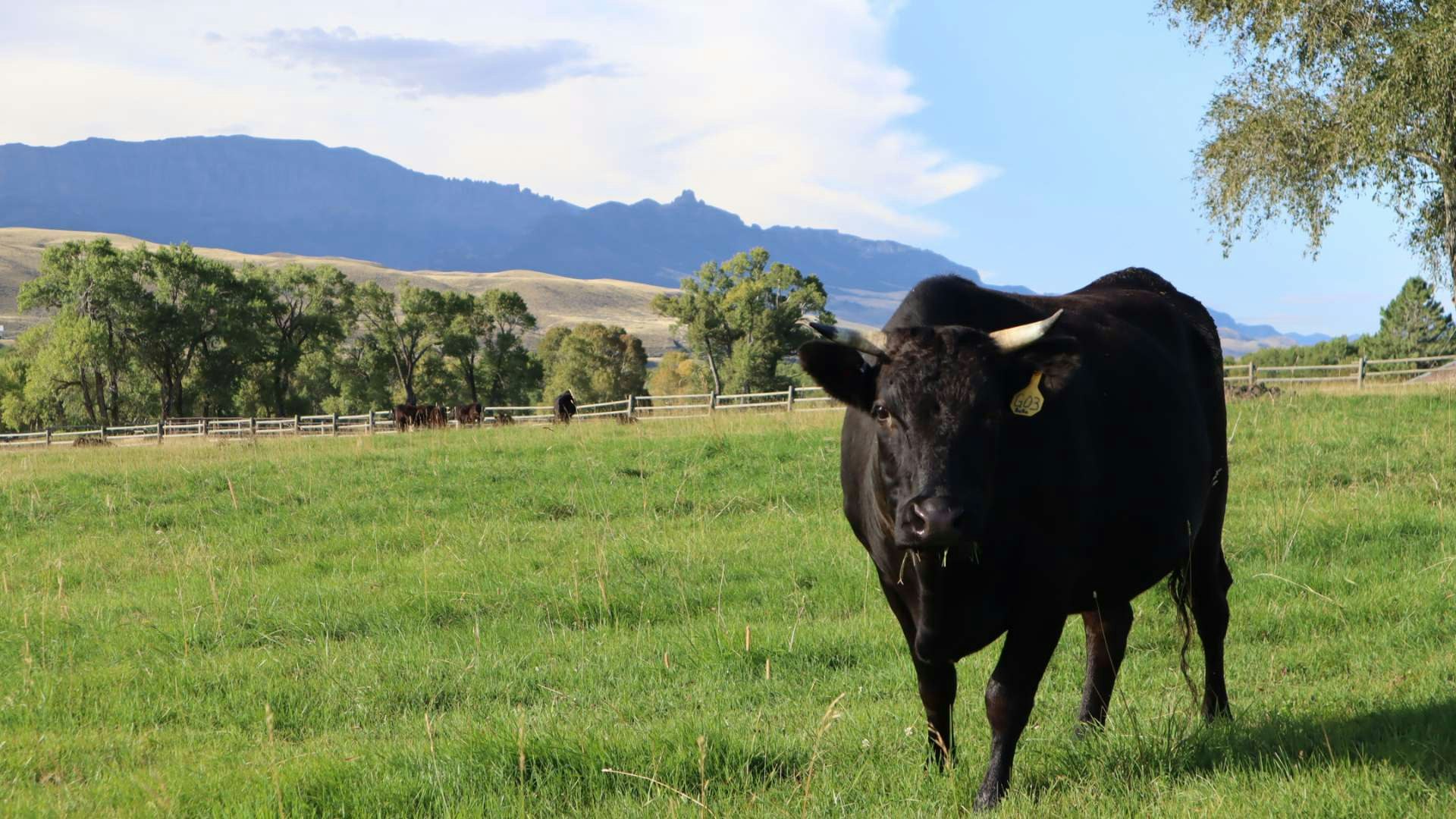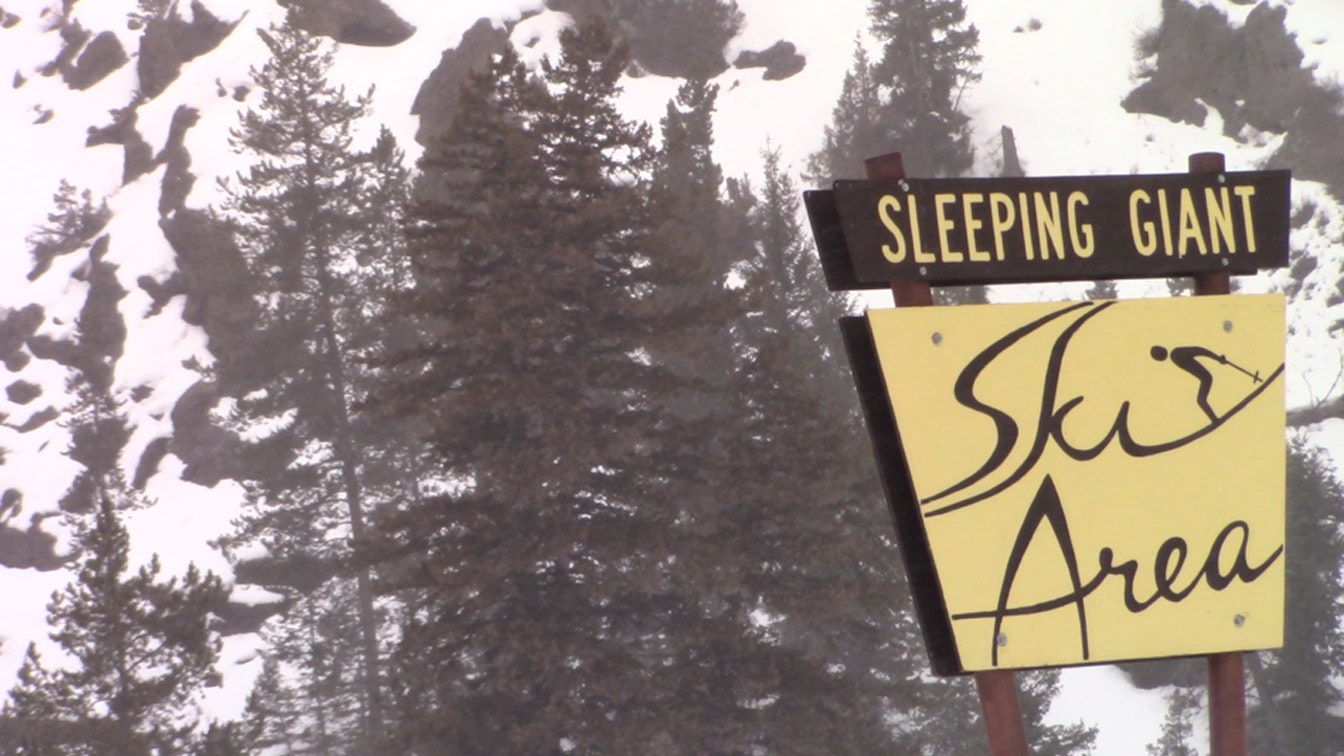CODY — It’s the ultimate pastoral Wyoming ranching scene.
Against a backdrop of Carter Mountain and Castle Rock along the south fork of the Shoshone River in Park County, a herd of black cattle peacefully graze. Now and again a quiet “moo” or playful snuffle will indicate communication between the bovines as they explore their mountain meadow.
This peaceful scene is exactly what livestock manager Tania Thacker strives for with a herd of 22 wagyu cattle at the Hawks Hill Ranch outside Cody. It’s 1,200 acres of riverfront, expansive grazing pastures, irrigated pastures, mountain pastures and corrals that turns out the highest of high-grade beef for high-dollar premium customers.
A Cut Above
The Hawks Hill wagyu score higher than almost any other beef on the market, Thacker said. She said their beef has been USDA graded at A-5 on the wagyu grading scale, with a beef marbling score (BMS) of 12, ranking it in the top 1% of beef on the planet.
“Less, like 5% of meat is graded at prime, so now we're grading prime-plus, and then out of the USDA scale,” said Thacker. “We can't grade any higher than that. And what it takes to achieve that is sticking to your program. You really have to have a really specific program from start to finish.”
Not Your Typical Cattle Operation
Unlike a typical Wyoming beef operation where numbers, weight and the bottom line are what matter most, Thacker says raising wagyu takes a different path.
“In a regular cattle operation, you wean your calves in the fall and you put them on a truck and ship them to a feedlot or somebody buys them,” she said. “Typically, 18 months tops is where they're going to draw their line, and then they're going to process those animals.”
But with wagyu, Thacker said she and the other three members of the staff operate on a five-year plan.
“We process no sooner than 29 months, and no later than 36 months,” she said.
Wagyu is a higher-stake monetary investment than a typical cattle operation as well. A finished wagyu beef carcass should bring $20,000 at the market, with individual cuts of meat selling for up to $150 a pound. And with the hanging weight of a finished carcass somewhere between 900 and 1,000 pounds, the money works out.
Why Wagyu?
Thacker explained that there are varying degrees of wagyu (the Japanese word for cow), from the Americanized breeds to the 100% full-blood Japanese wagyu. So much of her job is making sure that the herd’s genetics are impeccable with direct lineage to the animals’ Japanese heritage, and they’re never cross-bred.
“There are less than, I think, 30,000 wagyu in the U.S., but only 5,000 of them are actual full blood,” said Thacker. “And we only raise full-blood wagyu.”
Thacker said her position as livestock manager for the herd of wagyu has come with a steep learning curve. Although she is an experienced horse wrangler who has worked for neighboring cattle operations for the last 20 years, Thacker said raising wagyu is on a whole different track.
She researches potential breeders’ genetics to produce the most tender, tasty cuts of beef, choosing breeding pairs that will ensure superior marbling. But because Hawks Hill is also looking to grow its herd, Thacker also considers breeding that will produce strong maternal traits, strong structure and good milk.
“The genetic pool is small to choose from, so I have to do a lot of research on what I'm breeding and the steers that we're getting,” she said. “And it's not just because the genetics pool is small, but how do I keep the best genetics going for the best marbling?”
Making Friends
Thacker said she has developed “personal” relationships with the wagyu, particularly the females.
“All of our females are named, they're friendly, you can walk up and pet them,” she said, as she gives Raspberry a gentle scratch between the eyes while casting a watchful glance at the mischievous heifer they’ve named Neil Diamond, who has a tendency to seek adventure.
“Neil likes to jump fences,” said Thacker. “Raspberry’s a little bit ‘stranger danger,’ but then there’s Sweet Girl, who loves a good scratch.”
But those personality quirks work in Thacker’s favor. Because the herd is so small, each cow is monitored daily for even miniscule changes in their demeanor.
“I know by the flick of an ear if they’ve got something going on that I need to address,” said Thacker.
She said she tries not to name the steers since they’re the ones that will eventually become steaks and hamburger, but she said sometimes she can’t help it.
It’s The Love
But that personal attention is what makes the beef produced at Hawks Hill Ranch so tender. Thacker said the stress-free environment makes for an over-the-top culinary experience.
“Stress is a huge part of decreasing marbling for them,” she said. “So really low stress, we clean our corrals twice a day, we are constantly out in the pastures making sure they have exactly what they need. So, it's the whole program, start to finish, and meticulously monitoring them every day.”
But aside from making sure all the physical needs are met for the cattle, Thacker said she provides something extra that makes the Hawks Hill wagyu among the best in the world.
“All of their needs are provided, plus love,” Thacker said. “I get laughed at quite a bit for it, but it pays off at the end product.”
Thacker said when it’s time, she personally drives the steers to the USDA processing facility in Montana where the carefree days of the Hawks Hill beef cattle come to an end.
“It is a terrible day for me because I do put so much love and time and effort into these animals,” said Thacker. “But it's part of it, and I get it. And I look them in the eye and I let them know, like, some things on Earth are going to live longer than you will, but I will provide you the best possible life until that day comes.”
Strong Sales
Thacker said local restaurants carry their beef and farm-to-table sales have been brisk, and they’ve recently launched an online sales operation.
“We just started our online Shopify store,” she said. “So now if you get on our website you can order from anywhere, we ship anywhere in the lower 48 states.”
Thacker said the quality and taste of wagyu is unlike any other beef on the market, which is why they have no trouble moving their inventory, which includes brats, burgers, hot dogs and, of course, tenderloins and other steaks.
“Once you have the taste of wagyu, there's no going back, really,” said Thacker. “So, it's pretty exclusive.”
A Beautiful Life
Raising the herd in the peaceful South Fork Valley isn’t without its dangers, Thacker said.
“There’s the bears and mountain lions,” she said, referring to the natural predators that live nearby. “That's about the only stress the wagyu have is when a grizzly bear goes by. Their eyes get a little big, but they get pretty used to seeing them. And knock on wood, we've had no depredation issues. Everything seems to behave themselves.”
Thacker said that in addition to the pristine and pastoral environment, the extra care the staff lavishes on the animals is what sets the Hawks Hill Ranch apart from other Wyoming ranch experiences.
“What makes us different is that specific care – that going up and scratching Sweet Girl on her ears and paying attention to their nutrition, and then meticulously taking care of the calves,” she said.
And the ranch provides the kind of peaceful life many humans could only dream of.
“The wagyu are laying there, grazing on the grass watching the elk play in the river,” said Thacker. “It's a really beautiful life, not only for the two-legged, but the four-legged ones that are fortunate enough to live where we live.”
Wendy Corr can be reached at wendy@cowboystatedaily.com.





